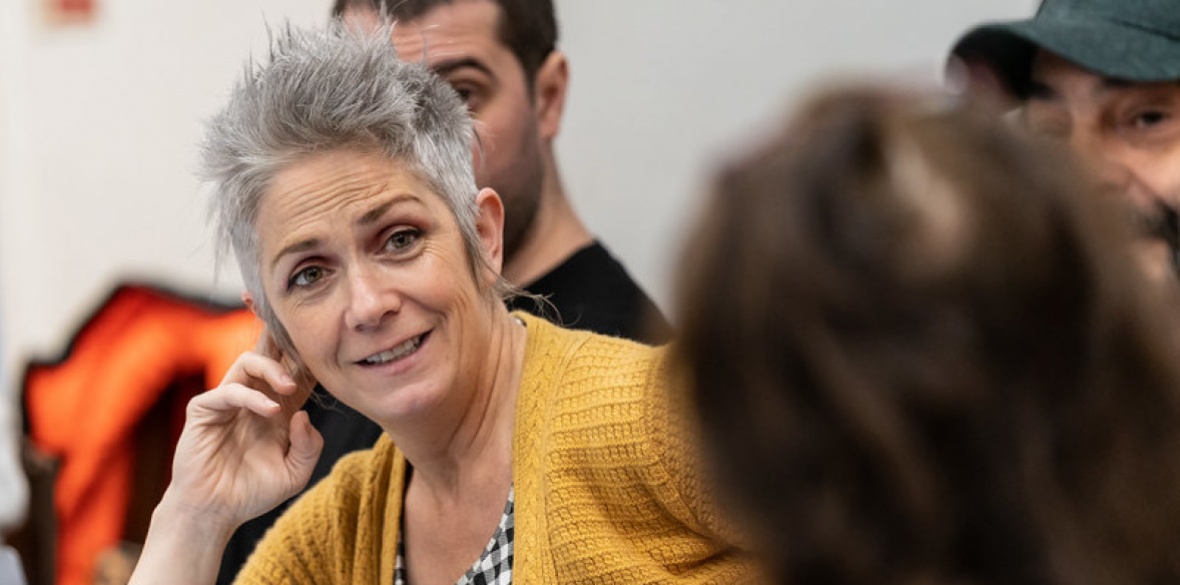This is the last article you can read this month
You can read more article this month
You can read more articles this month
Sorry your limit is up for this month
Reset on:
Please help support the Morning Star by subscribing here
MR PUNTILA and his Man Matti was Bertholt Brecht’s idea of a popular comedy — a sure-fire socialist crowd-pleaser. He believed in the play so much that in 1948 he used it to launch the Berliner Ensemble, the legendary theatre company whose practice still resonates globally.
He wrote it in Finland in 1940 while he hopped from country to country, staying one step ahead of the nazi occupations of European countries. Among his work of that period it is the odd one out, being entirely to do with economic relations and nothing to do with the war.
His idea was to take a Finnish folk-tale that had been written for the stage by a friend and to improve it. It was a significant aesthetic exercise that guided the play away from a traditional “dramatic” structure towards an episodic and didactic “epic” structure — less like A Doll’s House and more like a left-wing Peer Gynt.
A new adaptation, Mrs Puntila and her Man Matti, is about to hit the stage in Edinburgh and Glasgow and its author is Denise Mina, well-known for her crime fiction.
Curiously, she tells me that just as Brecht already had a play to work with, so she already had a cross-gendered cast. This new Scottish version came to her with Elaine C Smith, that formidable comic actress, already attached and in the principal male role. So, not so much Peer Gynt as Queer Gynt?
“No, Brecht doesn’t do gay,” says Mina. “Yet he certainly does do in-your-face misogyny. But forgive him, he was a man of his time. Politically, the gender switch is useful as it clarifies the message and cuts a lot of gratuitous arse-slapping.”
The message is to give the audience a forensic examination of how power speaks to the powerless — how the 1 per cent retain control. “It is for sure a patriarchal system that exploits women but patriarchy doesn’t just attach to gender.”
This gender-switched Puntila is a schizophrenic employer, who dishes out socialist solidarity when drunk but exploits her workers ruthlessly when sober. Could she be black and the argument remain the same? “Yes,” says Mina. “But to make the part work you need an excellent clown.”
Brecht’s play is renowned for a scene in which the employer seeks a workforce and workers are conned into signing crooked contracts at a “hiring fair.” In Mina’s version, it’s like a murderous job centre with zero-hour contracts and the contemporary language of contractual relations fits right in, she says.
Alongside it is Brecht’s message that the play repeats emphatically, like a nail takes a few blows to bang in. “We should burn those food banks,” says one character. “Never accept charity instead of your rights.”
For Mina, Brecht’s epic treatment is full of emotive stories about working-class people. And yet, as soon as you feel your emotions become involved, she relishes the fact that for Brecht emotional engagement is never enough.
He shows that it is a trick, that you are being manipulated, and he pulls you back. There’s no climax in the play and no neat time scale, just this process of becoming engaged and then pulling back. And a lot of comedy. A learning process — that’s what “epic” theatre is.
Mina has adapted the play to Scotland and her Mrs Puntila is a landowner, a kind of Duchess of Sutherland. What was Finnish window-dressing in the original — saunas and alcoholic cures for bovine fever — is now the golf industry and Ben Lomond.
And there’s a lot of double vision and a lot of alcohol. That’s where it becomes interesting for a Scottish writer, Mina believes, because that trope is a recurring motif in Scottish literature.
Alcoholism allows Brecht to explore the two faces of Puntila’s character, like Jekyll and Hyde. But this dualism is Brechtian dualism, politicised dualism. He is interested in alcoholism not as a social problem but as the means to expose the contradiction of ruling-class hypocrisy. And because he finds it funny.
Something of that same mischievous glee runs throughout Turkish director Murat Daltaban’s production. Every cast member plays contradictory characters from opposite ends of the social spectrum — the cleaner doubles up with the media mogul and the carer with the judge.
There’s a tradition in contemporary Scottish theatre of angry, comedic, sing-song polemical theatre and this production feels like 7:84 on a big budget. But will it change anything?
“Why is there not a revolution?” Mina replies, when I ask about her own politics as a creative artist. “Why does radical change seem like a luxury and not a necessity? Why do the most oppressed vote for the status quo?
“This play talks about rights and also responsibilities. Do we demand that power lives up to its responsibilities? These are abused by populism and the play shows how — with fake family values, fake security, fake contracts.
“And through it all rings that same message — never accept charity instead of your rights.”
So, I inquire, is the point of good art not so much to answer these questions as to deepen the contradictions they expose? To entertain, for sure, but with no catharsis? To probe? To leave us hanging?
Mina doesn’t answer, but leaves a smile hanging in the air.
Runs until March 21 at Royal Lyceum theatre, Edinburgh, box office: lyceum.org.uk and from March 25–April 11 at Tramway, Glasgow, box office: tramway.org. Angus Reid’s website is angusreid.co.uk and he’s on Twitter: @4AConstitution










